We have all been in situations that make us feel anxious, frazzled, confused, and panic-stricken.
And yet, some of us seem better than others at dealing with influxes of drama, pressure, and demand than others.
What is the secret to being cool, calm, and collected? And if there is a secret, how can we find our inner peace among the chaos in everyday life?

Spiritual Wanderer Course:
Being a lone wolf and a spiritual wanderer is a sacred calling in life – a unique and alchemical path of awakening. You don’t need to feel lost, alone, or stuck on your journey any more. It’s time to meet your soul’s deep needs for clarity, self-acceptance, and empowerment. Let us show you how …
Don’t worry. Learning how to ground yourself in any situation is an invaluable life skill that is far less complicated than you may think. Let me show you how in this article.
Table of contents
What Does ‘Grounding Yourself’ Mean?

To ‘be grounded,’ or ‘grounding yourself,’ essentially means staying connected to the present moment without getting lost in thoughts or emotions. As the ground, or earth, is symbolic of stability and strength, staying grounded essentially means finding your inner roots and your inner connection to the earth.
Staying Grounded Does Not Mean Fighting For Control
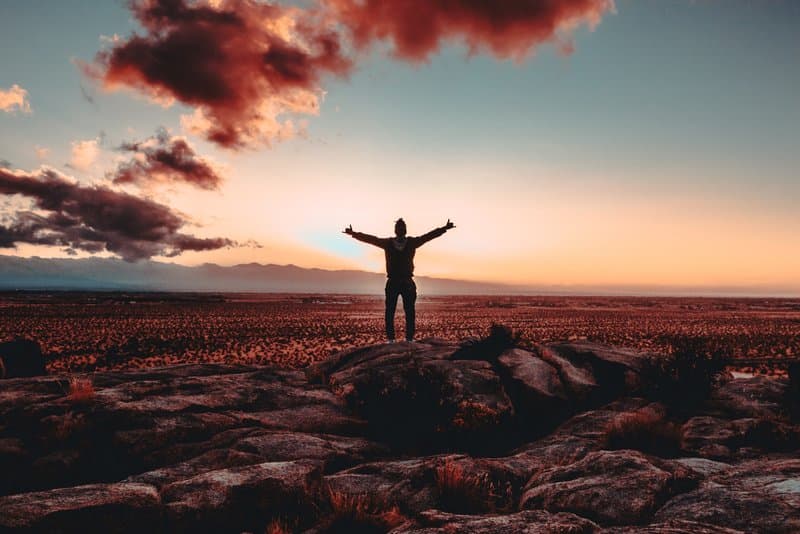
Once upon a time I used to be completely dumbfounded and annoyed by those who breezed through life, seemingly impervious and infallible to the thousands of little dramas that arise daily.
I used to wonder whether the cool serenity displayed by certain types of people was a result of luck. Perhaps they were just born as impenetrably tranquil demigods who were always, somehow, in control of life 100% of the time?
This mistaken belief that being grounded stems from being “in control” has led me down some pretty hairy paths. Eventually, after a lot of self-imposed anxiety, I learned that the key to grounding yourself doesn’t lie in controlling yourself, other people, or situations but in letting everything flow in its natural course. Sounds counterintuitive, doesn’t it?
The paradox is that the more you try to control or resist a situation – whether by demanding it to be a different way, by desiring something else to happen, or by forcing yourself to “look” a certain way – the more physical, emotional, and psychological turbulence you experience.
The more you accept a situation as it is – without trying to change it in any way or change yourself in any way – the easier it is to remain centered and whole.
Ironically, the more you relinquish control, the more power you have. And the more control you seek, the less power you have.
Life is strange, isn’t it?
Spirituality and Feeling Ungrounded

Many people in the world right now are undergoing what is known as a spiritual awakening journey. Sometimes, a spiritual awakening can be so intensely ungrounding and disturbing to one’s daily life that it can be categorized as a spiritual emergency (please read my spiritual emergency article for more specific guidance).
At the beginning of the spiritual journey, it’s common to feel ungrounded and spacey, and there are many reasons why this may be the case. For example:
- Feeling ungrounded due to exploring different levels of consciousness (through meditation, fasting, vision quests, plant medicine, and other avenues)
- Feeling ungrounded due to not taking the time to properly absorb realizations from spiritual psychedelic journeys (my psychedelic integration article will be of help)
- Feeling ungrounded due to overly developing the upper chakras (crown, third eye, throat, and heart) while ignoring and neglecting the lower chakras (root, sacral, and solar plexus)
- Feeling ungrounded due to falling into new age movement traps of delusional thinking that results in spiritual bypassing or spiritual narcissism
If you’re on the spiritual path and want to know how to ground yourself better, I highly recommend checking out the following resources:
- The Ultimate Guide to Root Chakra Healing
- How to Practice Spiritual Discernment (Avoid STDs!)
- 11 Deceptive Spiritual Traps Sabotaging Your Growth
- Spiritual Guidance: 11 Types & How to Find True Teachers
- Or you can see our Traps & Pitfalls sections on this website
Our Shadow & Light Membership can also be of great help to you, providing a solid anchor for you to ground yourself with each week. Highly recommended!
How to Ground Yourself in Any Situation (12 Ways)

And forget not that the earth delights to feel your bare feet and the winds long to play with your hair.
– Khalil Gibran
If you are struggling to keep your feet metaphorically on the ground and stay present in everyday life, you can learn how to ground yourself in any situation with these empowering tips:
- Focus on your inhales and exhales
- Drink a hot and non-caffeinated beverage
- Eat something healthy, heavy, and sustaining
- Focus on something beautiful
- Hold something (or someone)
- Have a grounding affirmation on hand
- Be self-compassionate
- Practicing self-remembering
- Practice the “looking back” technique
- Incorporate somatic mindfulness into what you do
- Focus on the actual earth
- Create physical distance
I’ll go more into depth into each of these points below:
1. Focus on your inhales and exhales

You might have heard this advice over and over again ad nauseam … but don’t take it lightly! Focusing on your breath when learning how to ground yourself is one of the easiest and most immediate ways of centering yourself in the Now.
You might notice that when you’re frenzied or bombarded by intense emotions, your breathing becomes shallow and quick, coming from your upper chest.
In order to ground yourself, focus on letting your breath become slow and soft. If it helps, repeat these words as a mantra: “Slow and soft, slow and soft.” The goal here isn’t to control your breath but to let it naturally and organically deepen.
Would you like to save this?
Your information will never be shared.
You might even like to try some conscious breath counting. For example, if you’re in a particularly tense situation, allow yourself to stop and start counting each breath you take, e.g., “One, (breathe), two, (breathe), three, (breathe), four, (breathe), five (breathe) …” until you have grounded yourself again.
See our article on breathwork for more guidance.
2. Drink a hot and non-caffeinated beverage

As mundane as this recommendation might sound, it’s surprisingly powerful. Heat is soothing and comforting, and it helps to ground us in the present moment (and in our bodies).
When we put the simple act of drinking + heat together, the result is near-instant relaxation (or at the very least, more groundedness).
So find ways to have little tea-drinking sessions throughout the day, but ensure that the liquid isn’t caffeinated. Caffeine tends to sensitize the nervous system, which is definitely something you’d want to avoid if you’re facing stressful situations.
My favorite grounding and relaxing teas include ingredients and herbs such as ginger, cinnamon, turmeric, damiana, and holy basil.
3. Eat something healthy, heavy, and sustaining

Not eating properly can lead to unnecessary stress, anxiety, and tension. As a basic form of self-care, make sure you get at least one healthy, heavy, and sustaining meal per day.
Focus on consuming root vegetables such as sweet potato, turnip, carrot, beetroot, cassava, and yams. If you eat meat, that can be quite grounding as well (organic is always the best), as well as complex carbs like brown rice, quinoa, beans, and oats.
If you’re struggling to find how to ground yourself in the moment, why not eat a big hearty meal with some of these ingredients?
4. Focus on something beautiful

Orienting to pleasure is a quick way of grounding yourself in any situation. When the mind is focused on beauty, it is much less likely to go into a spiral of fear or overwhelm.
Look around you. What soothing, beautiful, or visually appealing objects of attention can you find? Perhaps you might focus on a ray of sunlight shining on the wall, a tree in the distance, a nice shade of blue that you like, or a pattern on someone’s clothing. Take a few moments to let this beauty touch you and ground your mind and body.
5. Hold something (or someone)
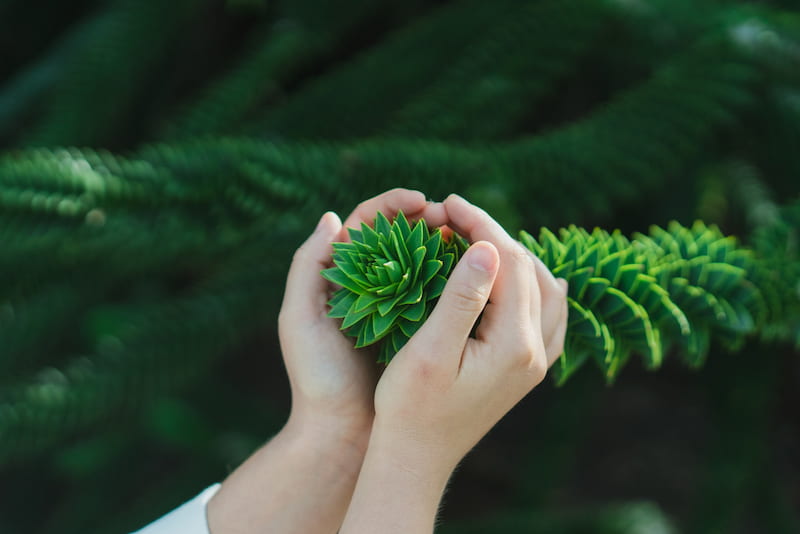
Pick up something interesting from your environment and observe it for a few seconds. Alternatively, if you have a pet or loved one nearby, hug them and focus on the warmth of this connection. You may also like to hold yourself in a self-hug – this is a great way of calming your nervous system.
Download FREE Ground Yourself Worksheets!
Go deeper with a grounding yourself journaling prompt + printable meditation mandala!
6. Have a grounding affirmation on hand
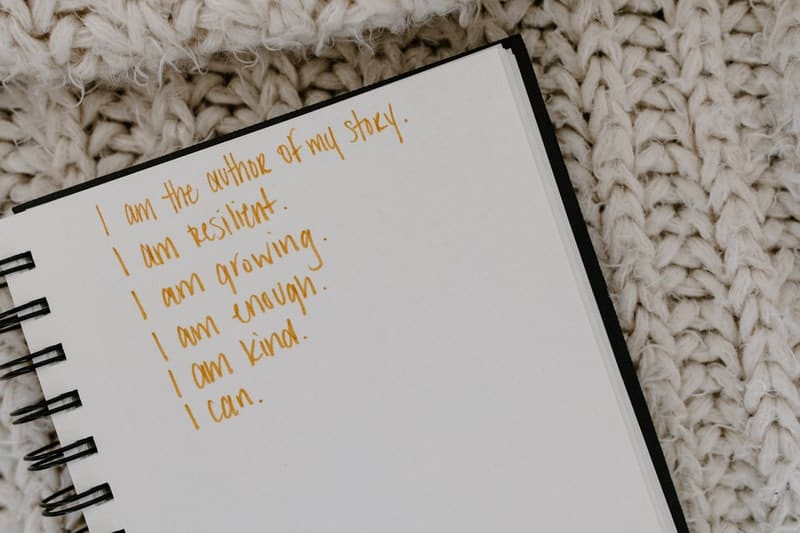
Affirmations are empowering statements that help to reprogram negative unconscious beliefs and infuse us with love, happiness, and confidence. It always helps to have a few grounding affirmations up your sleeve. If you don’t have any right now, some examples you could use are, “I am connected to the earth,” “I am safe,” “I relax and breathe deeply,” and “I let go and let be.”
See our article on morning affirmations for more guidance.
7. Be self-compassionate

Often, whatever we’re experiencing is nowhere as bad as what the tyrannical self-talk that is going on inside of our minds says.

Spiritual Awakening Bundle:
Find your spiritual purpose. Deepen your self-understanding. Learn to embrace who you are. Let us show you how …
How often have you been in a situation where your mind whispers (or screams) something like the following: “I can’t do this!” “They must think I’m pathetic,” “There must be something seriously wrong with me,” “I look like an idiot,” and so on.
Practicing self-love and self-compassion are essential practices for learning how to ground yourself. Simply being more kind and understanding of yourself will help you face intense situations much better in the future.
One surprisingly effective way to start being more self-compassionate is by practicing mirror work each day.
8. Practicing self-remembering

It is only by grounding our awareness in the living sensation of our bodies that the ‘I Am,’ our real presence, can awaken.
– Gurdjieff
We’ve all been conditioned since birth to project and maintain a certain image of ourselves around others. For example, your identity might be that of an autonomous, outspoken, and successful businesswoman or a thick-skinned, hands-on type of person who values efficiency.
Whatever the image of yourself is, it’s imperative for you to look beyond the veil of your ego’s beliefs, memories, ideals, feelings, sensations, and inner dialogues to your True Nature.
Ask yourself, are you really something as finite, transient, and changing as the feelings, thoughts, and beliefs that arise and fade each day within you? When you strip away everything that comes, goes, and changes (like your body, identity, and personality), who are you? What remains?
Self-remembering is the practice of stopping yourself at any moment and asking, “Is this really me?”
Once you learn that any situation, person, success or failure, and sensation is not really “you” and has nothing to do with who you really are, you can relax in the wholeness of your true Self.
It is through this realization that you can truly know that the nasty way your co-worker treated you this morning, the failure of your exam, the pressure of having to make a good impression, and so on, all have nothing to do with “you” – only your fabricated identity which only exists as a feeble thought.
9. Practice the “looking back” technique
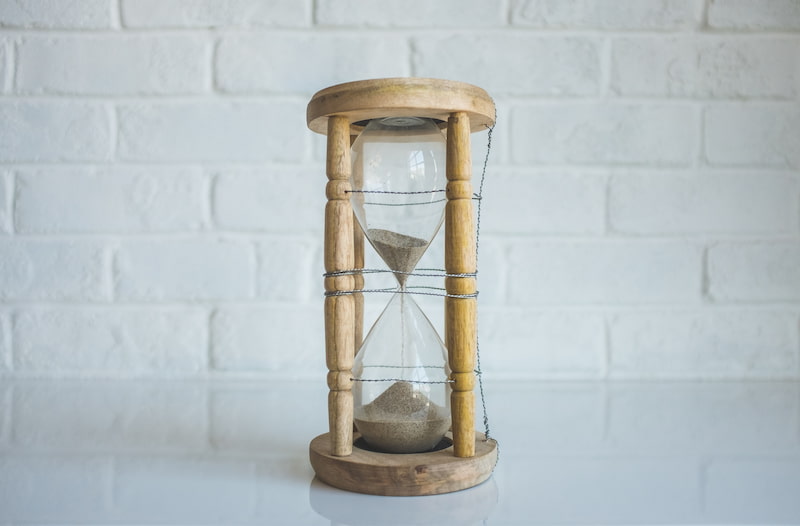
The looking back technique is very simple and works on the following premise: in 10 or 20 years time, will your current problem really matter?
Whatever you’re struggling with right now most likely won’t make much of a difference, and even if it does, there’s always something to learn from such situations. In fact, finding the meaning in your pain meaning is one of the most powerful ways of dealing with it – ask Nazi camp survivor Viktor Frankl who came up with the meaning-making philosophy of logotherapy.
The fundamental principle of life is that “everything will pass,” and so too will your source of irritation, frenzy, or anger. Understanding this can be tremendously grounding.
10. Incorporate somatic mindfulness into what you do

Somatic mindfulness is best paired with focusing on your breath which helps to anchor you into your body.
Also known simply as “body awareness,” somatic mindfulness helps to redirect the energy you are focusing on your thoughts, fears, and emotions to the sensations in your body.
For example, when I’m feeling particularly ungrounded, I like to focus on my breath and roll my shoulders up and down. Focusing on my body in this way helps me to not only dispel somatic tension that tends to accumulate easily but also to center myself in the present.
Other people like to scrunch their fingers and toes into tight balls and release them, clasp their hands together, stretch their limbs, stamp their feet, and many other body-centered techniques that are grounding and centering.
For more guidance, see my somatic bodywork guide.
11. Focus on the actual earth
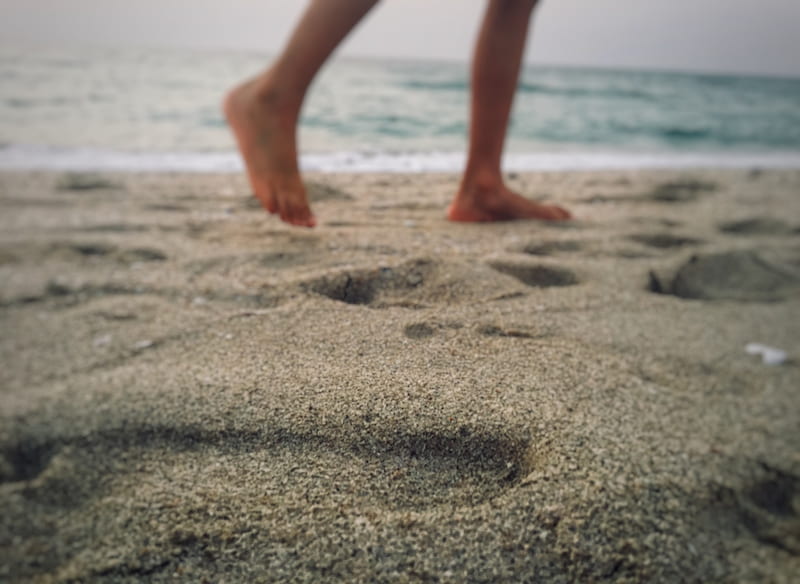
Learning how to ground yourself is intimately connected with the earth. What better way of finding that inner sense of solidity than going back to your primal roots?
To focus on the earth itself, draw awareness to the ground beneath you. Feel yourself being supported as you walk, stand, sit, or lie down.
If you enjoy visualizations, imagine your energy sinking deep into the earth, like tree roots. You can also pull up energy from the earth through your feet to help ground your entire body.
Also, physically walking on the earth barefoot, also known as “earthing,” can be tremendously grounding – I highly recommend you try this!
12. Create physical distance
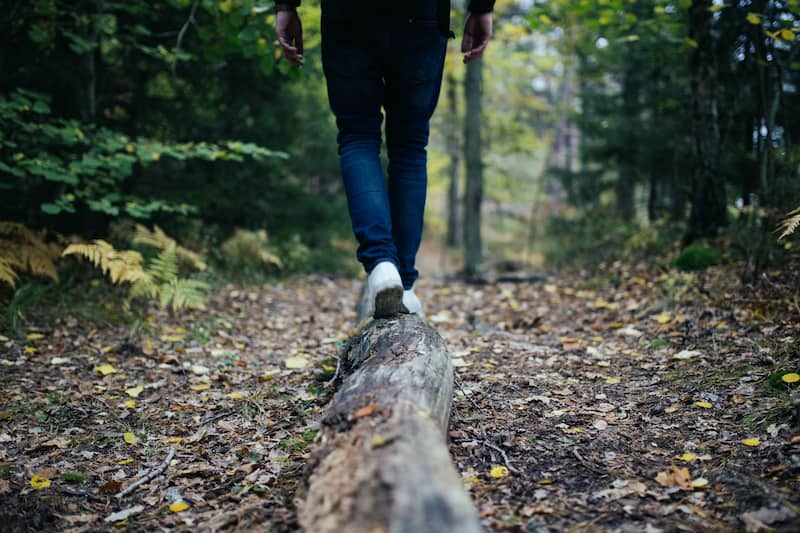
Quite simply: walk away. Get out of there!
While walking away from a situation is not always possible, it’s often extremely helpful to take a step back and wind down physically. This simple act allows your mind and body to process whatever has happened.
Finding solitude in nature is a particularly helpful way of creating physical distance from your problems, grounding yourself, and reminding you that life is so much more than your fears and troubles.
Ensure that you create some solitary time for yourself each day – it’s an excellent way of bringing everything back into perspective without getting lost in the details.
How to Ground Yourself Q&A
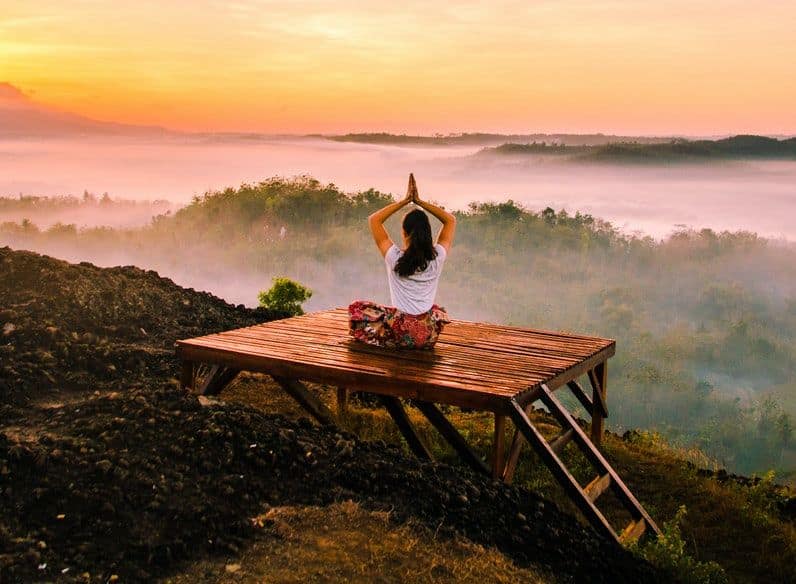
Try closing your eyes and focusing on your feet touching the earth. Stay connected to your body by curling your fists up into a ball, drinking a hot beverage, crossing your arms, giving your feet a massage, breathing deeply and slowly, or simply walking away and sitting in a quiet place by yourself.
Those who walk the spiritual path and have experienced a spiritual awakening can often find their energy becoming airy, spacey, and even dissociated. If you often feel like you’re floating away, try drinking a big glass of water, eating some hearty food, and going out in nature. Stop your spiritual practice temporarily and connect with your immediate environment. What can you see, smell, feel, hear, and taste?
Focus on self-soothing practices. Think about what makes you comfortable. Perhaps you need to listen to some calming music, wrap yourself in a heavy blanket, cuddle a pet, or take a walk in nature. Be gentle and kind with yourself. Becoming mindful of your self-talk will also help you to stay grounded if you have anxiety. Have an empowering affirmation on hand to help your mind settle such as, “I am centered” or “I am safe and supported.”
***
Learning how to ground yourself in any situation requires a little patience and persistence, but it is absolutely possible to do. Remember that it’s normal to feel ungrounded, and sometimes, despite our best efforts, we wind up feeling dissociated. But that’s just part of being human, and it’s okay!
You now have many paths, tools, and practices to use, and I hope they are of benefit to you. You’re just as capable of being calm and collected in daily life as anyone else – all that you need to do is practice a little bit. Experiment with these grounding practices and see what works for you.
May you have strong roots and feel grounded and connected to yourself, others, and life!
Tell me, what is your favorite way of staying grounded in overwhelming situations? Please share below in the comments. (You never know who you may help or inspire!)
For over a decade, we've strived to make this website a haven of free, valuable information. Imagine a world where this knowledge wasn't readily available. If this post sparked a meaningful insight or helped you in any way, please consider a donation as a heartfelt "thank you" for keeping this resource free. Every contribution, big or small, allows us to keep giving back.
Three paths to inner transformation – here’s how I can help you go deeper:
1. The Spiritual Wanderer Course: Are you feeling lost, adrift, and unsure of your life's purpose? Gain clarity, focus, and direction on your inner path by uncovering the five archetypes of awakening within you. Learn how to navigate the highs and lows of your inner journey and chart your unique path with 3+ hours of audio-visual content, workbooks, meditations, and a premium test.
2. Shadow & Light Membership: Do you crave consistent support on your spiritual quest? Receive weekly intuitive guidance and learn to embrace your whole self, including your shadow side. Cultivate deeper self-love with our affordable, personalized support.
3. Spiritual Awakening Bundle: Ready to embark on a profound soul-searching adventure? Dive into our collection of essential transformative resources! Explore five illuminating eBooks and seven in-depth journals, plus unlock two special bonuses to empower your spiritual growth.

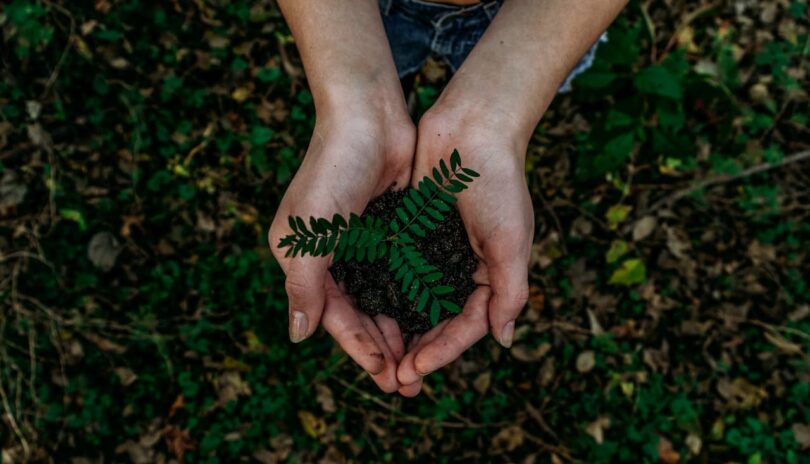




 $3
$3



I close my eyes, no matter where I am and put myself back in my safe place, my apartment. I start walking around in there and do whatever I want, use my imaginary senses, making it smell, feel, taste, see, hear, and the sixth sense of whatever I want. It’s so effective, I have to open my eyes and sometimes forget where I am!
My favorite quick grounding technique is massaging Northern Lights Black Spruce essential oil onto the soles of my feet. Drawing Up the Earth and drinking a cup of cacao every morning are also part of my daily devotional practice to ground and center myself.
What a terrific guide to grounding! I’ve only discovered grounding recently, through Jeffrey Allen’s energy course, and it is such an amazing technique. You can also ground people and spaces around you. I struggle with anger around a specific family member. I will practice these techniques when around them.